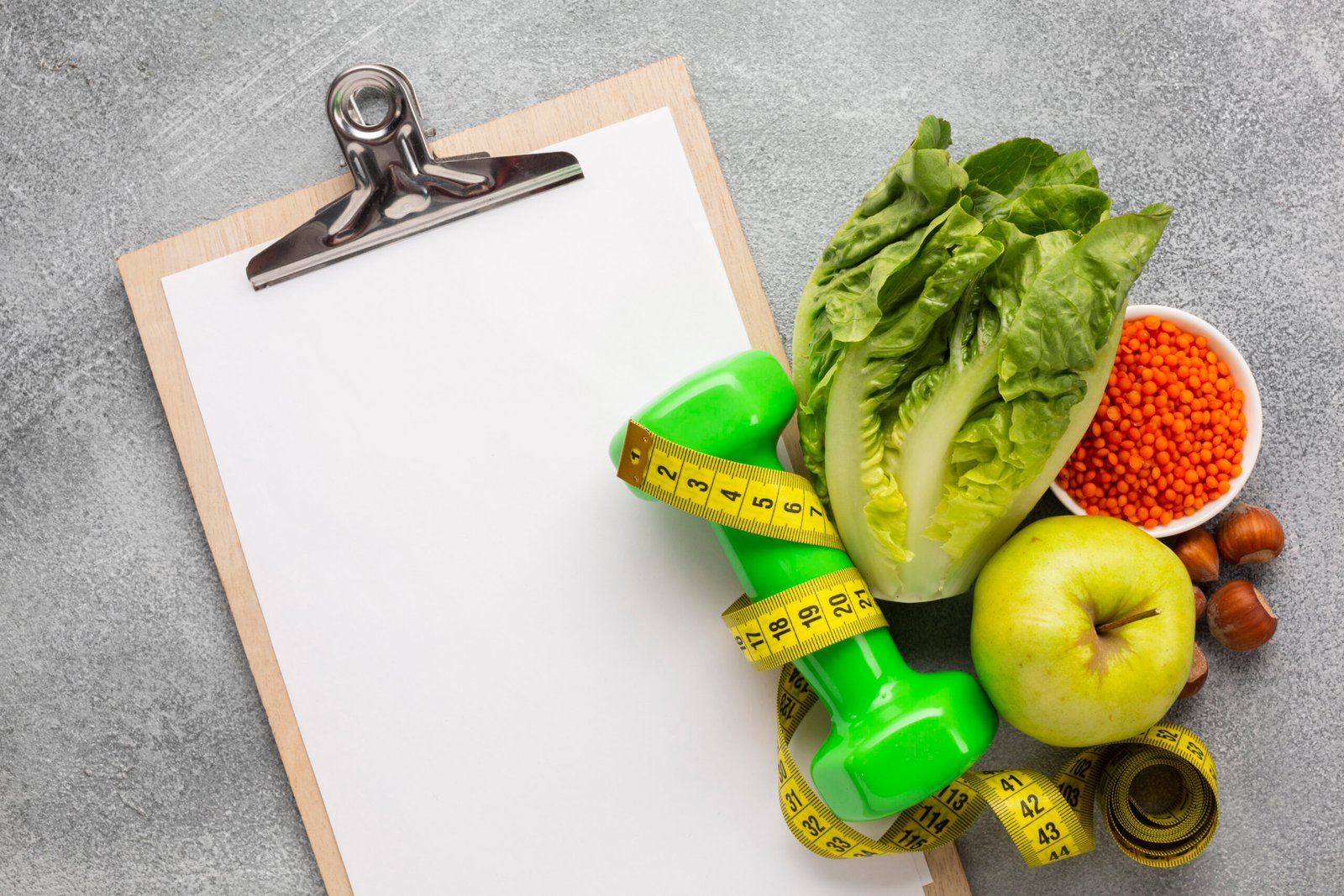A 7-Day Vegetarian Diet Plan: Your Path to Healthy Weight Loss
By adopting a vegetarian diet, I have not only experienced a transformation in my body, with weight loss, but also a significant improvement in my overall well-being. I want to share this journey with you, showing you how this dietary choice can be an effective and enjoyable path to achieving your health goals.
In times when the search for a healthy lifestyle and sustainable weight loss are on the rise, the vegetarian diet stands out as a viable and effective alternative. Changing the way you eat is not just a trend, but a conscious choice that can provide significant benefits not only for weight loss, but also for your mental and physical health.
In the context of a slow metabolism, understanding how plant-based foods can positively influence this condition is essential. In this article, we will explore the principles of the vegetarian diet, its advantages for weight loss and general well-being, and how it can help reactivate your metabolism.
Let’s discover together how this approach can transform your life!
Throughout the article, you will learn about the main food groups of this diet, practical tips for implementing it in your daily life, as well as strategies for dealing with common difficulties faced on this journey.
Get ready for a deep dive into the intersection between nutrition, health and conscious weight loss.
What is the Vegetarian Diet?

A vegetarian diet is an eating style that excludes meat but may include animal products such as dairy and eggs. There are several different types of vegetarianism, including strict vegetarianism (which does not consume any animal products) and lacto-vegetarianism (which includes dairy but not eggs). The basis of the diet is mainly composed of fruits, vegetables, whole grains, legumes, nuts and seeds.
This diet not only promotes weight loss, but is also associated with a number of health benefits, such as reducing the risk of chronic diseases, including type 2 diabetes, hypertension and cardiovascular problems.
The increase in fiber intake and the decrease in saturated fats present in meats are important factors that contribute to this scenario. Let’s explore a little more about the ingredients that make up this diet and how they can help with weight loss.
The Main Foods in the Vegetarian Diet
The foods that make up the vegetarian diet are rich in nutrients and, when well selected, offer a balanced combination of essential macro and micronutrients. Here are some of the main food groups and their benefits:
- Fruits and Vegetables: These are rich sources of vitamins, minerals and fiber. Increasing their consumption helps regulate intestinal transit and promotes satiety, which is essential for weight loss.
- Whole Grains: Foods such as quinoa, brown rice and oats are rich in fiber and protein, in addition to providing energy slowly, avoiding glucose spikes.
- Legumes: Beans, lentils and chickpeas are excellent sources of vegetable protein, contributing to increased satiety and maintaining muscle mass during weight loss.
- Nuts and Seeds: Rich in healthy fats, they help control hunger and are important sources of omega-3, which is beneficial for cardiovascular health.
Understanding how each of these food groups works together can help you create tasty and nutritious dishes that promote not only weight loss, but also greater overall well-being. The following table summarizes the main properties and benefits of each of these foods:
| Food Group | BBenefits | Examples |
|---|---|---|
| Fruits and Vegetables | Rich in fiber, vitamins and antioxidants | Apple, spinach, carrot |
| Whole Grains | They provide long-lasting energy and aid digestion | Quinoa, oats, brown rice |
| Legumes | Rich sources of protein and fiber | Beans, lentils, chickpeas |
| Nuts and Seeds | They contain healthy fats and help with satiety | Almonds, chia, flaxseed |
Advantages of a Vegetarian Diet for Weight Loss
One of the greatest advantages of a vegetarian diet is its ability to facilitate weight loss in a healthy and sustainable way. When well structured, it is naturally low in calories and rich in nutrients.
This results in a diet that, despite providing satiety, does not contribute to weight gain. In addition, a vegetarian diet offers a series of other benefits:
- Reduced Risk of Disease: Studies show that individuals who follow a vegetarian diet are less likely to develop heart disease, type 2 diabetes and certain types of cancer.
- Improved Mental Health: Including foods rich in antioxidants and essential nutrients can help improve mood and mental health, factors that are intrinsically linked to weight loss.
- Smallest Ecological Footprint: Adopting a plant-based diet has a positive impact on the environment, reducing the demand for animal products and, consequently, carbon emissions.
In short, a vegetarian diet not only helps with weight loss, but also provides a range of benefits that go far beyond the scale. Committing to this dietary change can result in a healthier and more conscious lifestyle.
Practical Tips for Implementing a Vegetarian Diet
Implementing a vegetarian diet may seem challenging at first, especially if you are used to a meat-based diet. However, with a few practical tips, this transition can become easier and more enjoyable:
- Plan Your Meals: Take the time to plan your meals, ensuring variety and balance. This will help you avoid impulsive and unhealthy food choices.
- Try New Recipes: There are countless delicious vegetarian recipes available online. Don’t be afraid to experiment with new ingredients and flavors.
- Consume Plant-Based Proteins: Include legumes in your meals, such as beans and lentils, to ensure adequate protein intake.
- Invest in Supplements if Necessary: Consider supplementing with nutrients that may be lacking, such as vitamin B12, especially if you choose a vegan diet.
Following these tips can make your adaptation easier and more enjoyable. The goal is to make the vegetarian diet a natural part of your daily routine.
See more articles about effective diets:
- Unlocking the Secrets of Intuitive Eating
- Effective Diets: How to Transform Your Lifestyle and Achieve Sustainable Results
- 10 Healthy Recipes to Lose Weight with Flavor and Convenience
Overcoming Common Challenges on a Vegetarian Diet
Although a vegetarian diet offers many benefits, some challenges may arise along the way. Below, we discuss the main obstacles and how to overcome them:
- Lack of Variety: Monotonous eating habits can be discouraging. The solution is to explore new types of recipes and ingredients, always trying to bring something new to the table.
- Difficulty Eating Out: Many restaurants offer vegetarian options, but it is always a good idea to call ahead or check the menu online to make sure there are options that meet your needs.
- Increased Hunger: When you first start the diet, you may feel more hungry. To overcome this, it is important to include foods rich in fiber and protein, which increase the feeling of fullness.
By maintaining a positive mindset and focusing on the benefits, it is possible to overcome these challenges and enjoy all the positive aspects of the vegetarian diet.
Slow Metabolism and Its Relation to the Vegetarian Diet
Slow metabolism is a reality for many people, and it can make weight loss a challenge. The good news is that a vegetarian diet can help optimize metabolism. Including foods rich in fiber, such as whole grains and legumes, can speed up metabolism, as the body requires more energy to digest these fibers.
In addition, increasing the intake of antioxidants from fruits and vegetables can improve the efficiency of metabolism. Studies indicate that diets rich in nutrients, such as plant-based ones, not only help with weight loss, but also promote an improvement in overall metabolic health.
Focusing on a diet rich in plant-based proteins is also essential, as it helps maintain muscle mass. Preserving muscle mass is crucial for a good metabolic rate, since muscle burns more calories at rest than fat.
Checklist for a Balanced Vegetarian Diet
To help you ensure that you are following a balanced vegetarian diet, we have compiled a checklist that you can use:
- Include foods from all food groups: fruits, vegetables, whole grains, legumes and nuts.
- Check your daily plant-based protein intake.
- Increase hydration by ensuring that you drink enough water throughout the day.
- Look for a variety of recipes to avoid monotony.
- Consider supplementing with nutrients such as B12, iron and omega-3 fatty acids.
My Tips:
- Vegetarian Diets: Do They Help Me Lose Weight?
- How to LOSE WEIGHT and Keep It Off with a Plant-Based Diet!
- Easy Vegetarian Diet Plan to Lose Weight Fast in 10 Days | Best Vegetarian Diet Plan for Fast Weight Loss
My Conclusion: Mastering the Vegetarian Diet for Weight Loss 🌿✨
After exploring the profound principles and myriad benefits of the Vegetarian Diet, it’s abundantly clear that this approach is far more than just a dietary choice; it’s a conscious lifestyle decision with immense potential for Weight Loss and overall well-being. My biggest takeaway is that by embracing the power of plant-based foods, you can not only achieve your weight goals sustainably but also unlock a healthier relationship with food and even contribute positively to the planet. 🌍
Here are my ultimate conclusions and actionable strategies for you to master the Vegetarian Diet for effective and conscious Weight Loss:
- Embrace the Power of Plant-Based Proteins: Don’t let the myth of insufficient protein deter you! 🍗➡️🌱 Legumes (beans, lentils, chickpeas), tofu, tempeh, quinoa, and nuts are your new best friends. Prioritize these in every meal to ensure satiety, preserve muscle mass (crucial for a healthy metabolism), and keep hunger at bay. Experiment with diverse plant protein sources to ensure a complete amino acid profile.
- Fiber is Your Weight Loss Ally: The Vegetarian Diet is naturally rich in fiber, and this is a superpower for Weight Loss and metabolic health. 🍎🥦 Fiber-rich fruits, vegetables, and whole grains expand in your stomach, promoting prolonged fullness and aiding digestion. This sustained satiety is key to naturally reducing overall calorie intake without feeling deprived. Make it a goal to include a variety of colorful produce in every meal.
- Hydration and Mindful Eating are Non-Negotiable: Water 💧 is essential for metabolic processes and can help you differentiate between thirst and true hunger. Pair your plant-based meals with ample hydration. Furthermore, practice mindful eating: savor each bite, eat slowly, and pay attention to your body’s hunger and fullness cues. This conscious approach enhances satisfaction and prevents overeating, a cornerstone of Weight Loss success.
- Strategize for a Boosted Metabolism: The Vegetarian Diet can significantly optimize a slow metabolism. The high fiber content requires more energy to digest, and the abundance of antioxidants from fruits and vegetables improves metabolic efficiency. Ensure you’re consuming enough calories from nutrient-dense sources to avoid inadvertently slowing your metabolism down.
- Plan for Success & Overcome Challenges: Transitioning to a Vegetarian Diet might seem daunting, but planning makes it seamless. 🗓️ Meal prep is your secret weapon for variety and balance. Explore new recipes online and don’t be afraid to experiment with new ingredients and flavors to combat monotony. When eating out, check menus beforehand or call ahead to ensure healthy, satisfying options. If you feel increased hunger initially, focus on fiber and protein-rich plant foods.
- Consider Smart Supplementation (If Needed): While a well-planned Vegetarian Diet is highly nutritious, some nutrients like Vitamin B12, Iron, and Omega-3s might require careful attention, especially for stricter vegan approaches. Consult a healthcare professional or registered dietitian to assess your needs and consider supplementation if necessary. This ensures your Weight Loss journey is not only effective but also nutritionally complete.
- Embrace the Holistic Benefits: Remember, the Vegetarian Diet offers advantages far beyond just Weight Loss. It’s linked to a reduced risk of chronic diseases (like heart disease and type 2 diabetes), improved mental health due to nutrient density, and a smaller ecological footprint. Committing to this dietary change is an investment in a healthier, more conscious, and sustainable lifestyle.
By integrating these principles and strategies, you are not just adopting a diet; you are embracing a transformative way of living that empowers you to achieve sustainable Weight Loss and cultivate holistic well-being. Which aspect of the Vegetarian Diet are you most excited to explore first? Share your thoughts below! 👇
Frequently Asked Questions about Vegetarian Diets and Weight Loss
Here are some of the most frequently asked questions about vegetarian diets and weight loss, with practical and straightforward answers:
- Is a vegetarian diet really effective for weight loss? Yes, when properly structured and balanced, it can be very effective for weight loss.
- Can I get enough protein on a vegetarian diet? Yes, there are many sources of plant-based protein, such as legumes, tofu, seitan, and nuts.
- Can a vegetarian diet cause nutritional deficiencies? It is important to plan your diet well to avoid deficiencies, especially of B12 and iron.
- Is it difficult to follow a vegetarian diet? It may seem complex at first, but with planning and practice it becomes easier.
- What are the benefits of a vegetarian diet besides weight loss? In addition to helping with weight loss, it contributes to cardiovascular health, improves digestion, and reduces the risk of chronic diseases.
Article Notes
This article explores how a vegetarian diet can be an effective approach to weight loss and improving overall well-being. It covers the principles of a vegetarian diet, its main food groups, and the benefits of a plant-based diet. The article also offers practical tips for implementing a vegetarian diet, overcoming common challenges, and optimizing your metabolism. It also discusses future trends and answers frequently asked questions on the topic.
Future Trends in the Vegetarian Diet
The vegetarian diet is constantly evolving, influenced by new research and health trends. Some of the main trends include:
- Plant-Based Foods: The popularity of vegan and vegetarian products, such as plant-based burgers, is growing rapidly, offering delicious and healthy alternatives.
- Focus on Sustainability: With increasing concern for the environment, many consumers are opting for diets that are not only healthy, but also sustainable.
- Technology Integration: Apps and online tools are making it easier to adopt a vegetarian diet by offering recipes, meal plans, and nutritional information.
These trends are not only shaping the future of the vegetarian diet, but are also benefiting a growing number of people who are looking to improve their health and well-being.
By the end of this long journey on the vegetarian diet, we hope you feel more prepared to embark on this conscious weight loss journey. With proper planning and a positive attitude, it is possible to reap all the benefits of this dietary choice and transform your life for the better. Remember that every step counts and that knowledge is the key to success. Get started now and experience the wonders that the vegetarian diet can offer!














1 comment